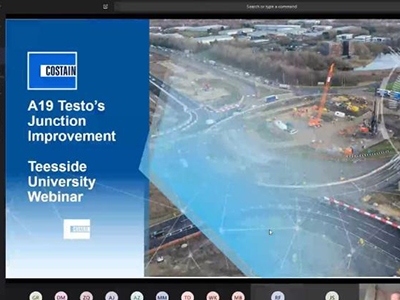Course overview
You develop skills in a range of disciplines in civil engineering to help you progress your career through employment, promotion or further study.
You could progress onto our BSc (Hons) Construction Management or BEng (Hons) Civil Engineering.
Course details
Course structure
Core modules
You gain the underpinning knowledge of construction technology. The materials and techniques used to achieve the basic principles of construction technology are constantly evolving to enable the construction industry to deliver better quality buildings. Scarcity of resources and the continuing demand of more sophisticated clients, end users and other stakeholder interests, are driving the construction industry to provide buildings which facilitate enhanced environmental and energy performance, and greater flexibility, in response to ever increasing financial, environmental, legal and economic constraints.
You are introduced to different technological concepts used to enable the construction of building elements; from substructure to completion, by understanding the different functional characteristics and design considerations when selecting the most suitable technological solution.
Civil Engineering Construction Technology (HN)
You explore the role of professional civil engineers, their essential involvement in the construction and maintenance of earthwork and substructure activities, and the key technologies they apply.
You cover: earthwork activities, temporary and permanent dewatering procedures, methods and techniques used to create substructures and the common hazards, technical problems and solutions associated with modern civil engineering activities. The impact of earthworks on superstructures and infrastructure is also explored. Principles of Sustainable Urban Drainage Systems (SUDS) are also examined and design principles of infiltration systems introduced.
Although there is a strong theoretical underpinning there is also considerable emphasis on enabling you to become aware of the processes of selection of appropriate methods and resources utilising realistic case studies.
Construction Practice and Management (HN)
You gain an overview of the industry’s size and operation of construction companies. Health and safety performance is considered and also how BIM has the potential to influence a range of construction processes and operations.
You develop an understanding of construction practice and management processes. You investigate and research the modern construction industry, both from the practical skills embedded within the industry through to its links with development on-site and the connection with construction management; including roles within the industry.
Construction Science and Materials (HN)
You develop basic knowledge of the properties of materials needed to successfully complete the other core and specialist modules. You analyse, apply, investigate and evaluate scientific principles and the properties and behaviour of materials in construction related situations. It is contextualised for construction, civil engineering or building services engineering and the delivery and assessment is tailored to your particular vocational needs.
Construction Structural Mechanics (HN)
You are introduced to common types of structure used in engineering and assess the types of loads they must resist. You are provided with the analytical skills necessary to design the components that make up the structure. Specific areas of study includes basic concept of force, stress and strain, properties of materials and sections, analysis of frames, beams and columns, equilibrium conditions and statically determinacy, beam bending moment, shear force and deflection.
Geotechnics and Site Surveying (HN)
You gain an introduction to the importance of geological processes and the properties of soils and rocks in civil engineering. You perform laboratory practicals in soil and rock description and geological map interpretation
You apply the skills and knowledge that you developed in other modules of the course (and where possible experiences from work) within a major piece of work that reflects the type of performance expected of construction technologists.
You develop your ability to identify, define, plan, develop and execute a successful project by working through a clear process. You develop a project brief, outlining a problem that requires a solution, as well as a project specification, the specific requirements of which the final outcome must meet.
You research the problem, undertaking a feasibility study, and consider a range of potential solutions using critical analysis and evaluation techniques to test, select and contextualise your preferred solution. You also provide a work and time management plan, keeping a diary of all activities, reflecting on their process and their learning throughout the project.
Mathematics for Construction (HN)
This module develops your underpinning mathematical knowledge and techniques relevant to studies in construction and civil engineering. You are introduced to mathematical methods and statistical techniques in order to analyse and solve problems within a construction engineering context. It has been designed to enable you to develop your knowledge of algebra, trigonometry, calculus, statistics and probability, for the analysis and solution of realistic construction problems.
Modules offered may vary.
How you learn
The course is delivered using a combination of practical sessions, lectures and tutorials. You are required to complement your learning with self-study.
How you are assessed
Assessment is by written assignments, case studies, projects and tests which are planned throughout the year.
Our Disability Services team provide an inclusive and empowering learning environment and have specialist staff to support disabled students access any additional tailored resources needed. If you have a specific learning difficulty, mental health condition, autism, sensory impairment, chronic health condition or any other disability please contact a Disability Services as early as possible.
Find out more about our disability services
Find out more about financial support
Find out more about our course related costs
Entry requirements
Entry requirements
64 points, including maths, from any combination of acceptable Level 3 qualifications including A-level, BTEC, Access to HE Diploma, Scottish and Irish Highers, T-Level, or the International Baccalaureate. We accept T-Levels which include Level 3 maths and cover topics in calculus.
Find out how many points your qualifications are worth using the UCAS tariff calculator.
We are not accepting applications from international students requiring a Student Visa for this course.
For general information please see our overview of entry requirements.
International applicants can find out what qualifications they need by visiting Your Country.
You can gain considerable knowledge from work, volunteering and life. Under recognition of prior learning (RPL) you may be awarded credit for this which can be credited towards the course you want to study.
Find out more about RPL
Employability
Career opportunities
You can apply your knowledge and skills in a range of roles in civil engineering management, structural design, environmental engineering, water engineering, surveying, highways and transportation.
Information for international applicants
Qualifications
International applicants - find out what qualifications you need by selecting your country below.
Select your country:
Useful information
Visit our international pages for useful information for non-UK students and applicants.

 HNC Civil Engineering
HNC Civil Engineering

